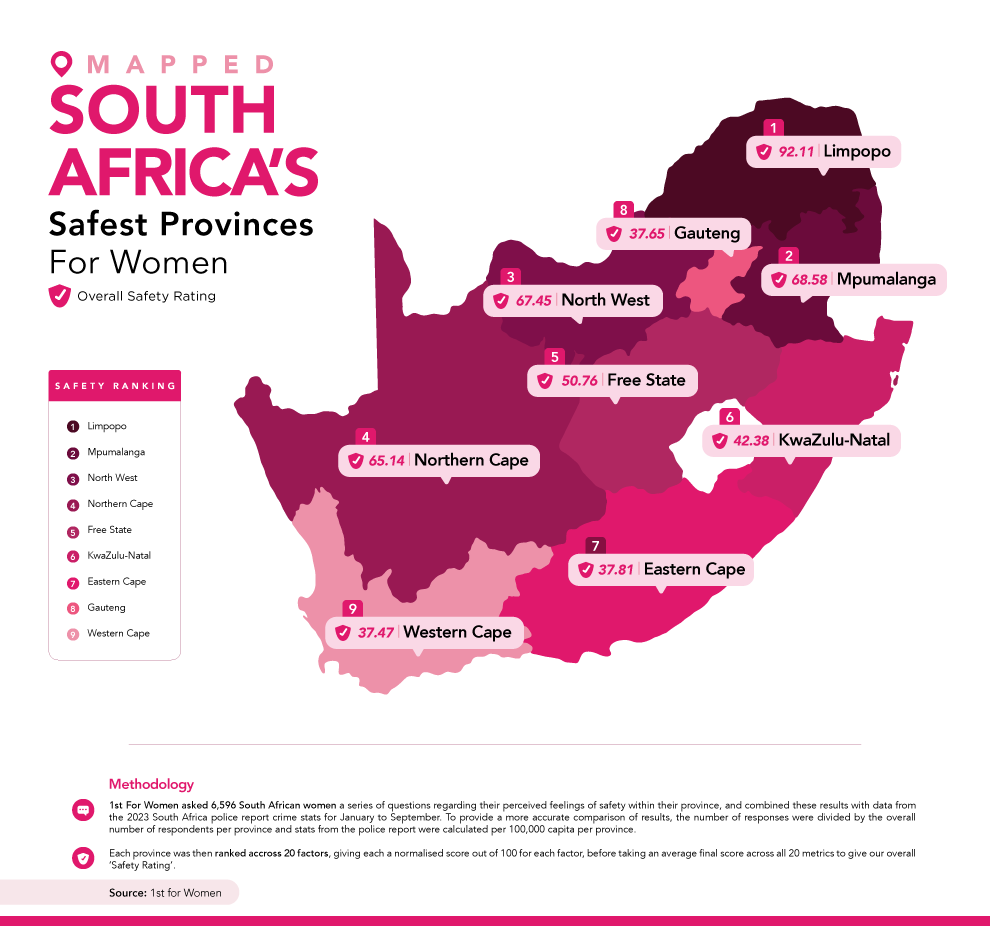
1st For Women, the home insurance brand specifically designed for women, has embarked on a campaign to uncover which province is the safest to live in after its nationwide survey of women uncovered that a shocking 76% feel unsafe in the country and 30% are considering emigration due to safety concerns.
With female safety, a basic human right, constantly top of mind for South African women, the ‘Let’s talk About Safety’ survey of 6,596 women, revealed just how many are feeling ‘unsafe’ or ‘completely unsafe’ in everyday situations in their province. This included walking alone at night (98%) driving alone (77%), going out with friends (63%), walking alone during the day (66%) and even, simply, being alone at home (54%). Sadly, many respondents had also already been victim to a crime (61%) including a house robbery or break-in (32%), cellphone theft (24%), handbag theft (13%), smash and grab (8%), gender-based violence (6%) and hijacking (5%).
Although eradicating crime is not a simple solution, 1st For Women wants to empower females to feel more fearless by providing expert advice, insurance protection, helpful tools and data insights that can help aid women to feel safer, which is why the ‘Safest Provinces Index’ was created.
By analysing both the South Africa Police Service (SAPS) crime data for January – September 2023, alongside the feelings on female safety from the nationwide survey, an index ranking 20 data points has uncovered the three safest provinces as Limpopo (scoring 92.11 out of 100), Mpumalanga (scoring 68.53) and the North West (scoring 67.45).
Of those surveyed, Limpopo had the lowest number of females who felt ‘unsafe’ or ‘completely unsafe’, as well as who had been a victim of a crime, aligning with the findings from the most recent Victims of Crime Survey4. When considering crime reports, it also indexed best for lowest community-reported serious crimes, murders, assaults, property-related crimes (including burglaries) and theft of motor vehicles or motorcycles.
Head of 1st For Women Insurance, Seugnette van Wyngaard, explains that “Western Cape has come bottom of the safety index (scoring 37.47) as it had the highest reported crimes per 100,000 capita for community-reported serious crimes, property-related crimes and theft of, or from, a motor vehicle. However, despite reports for some crimes being high, this does not necessarily mean they are more frequent. The region has a well-established infrastructure for reporting crimes here and, as such, higher crime stats could be down to a more supportive reporting culture, which is actually a positive rather than a negative.
“The index is a reflection of crimes which have been reported only, and women’s perceptions of safety within their provinces, so can only give us part of the bigger picture. We’ve used the data available to us to highlight the provinces which score safest to help females choose where to live, work, study and, hopefully, feel more fearless here in South Africa.”
Wyngaard, offers women ten tips for staying safe no matter which province they reside in;
-
“Stay Informed: Keep abreast of local news and crime updates. Awareness of your surroundings is the first step towards personal safety.
-
Buddy System: Arrange to travel with a friend or colleague if you believe an area or journey is unsafe. There’s strength in numbers, and companionship adds an extra layer of security.
-
Avoid Risky Areas: Be mindful of your route and avoid poorly lit or unfamiliar areas, especially at night.
-
Self-Defense Classes: Equip yourself with basic self-defense skills. Attend workshops or classes to enhance your ability to protect yourself if needed.
-
Use Technology to Your Advantage: Leverage safety apps like the Guardian Angel App, designed to send alerts and your location to chosen contacts in case of an emergency.
-
Home Security: Invest in robust home security measures. Install quality locks, alarms, security doors, and surveillance cameras to safeguard your residence.
-
Car Safety: Ensure your vehicle is well-maintained and has working safety features. Be cautious of your surroundings, especially during car trips.
-
Insurance for Protection: Secure your assets with reliable car and home insurance. These serve as financial safeguards in case of theft or damage.
-
Trust Your Instincts: If something feels off, trust your instincts. If a situation seems unsafe, remove yourself from the situation and seek help as soon as possible.
-
Emergency Numbers: Save emergency contacts in your phone and have them easily accessible so you know who to call in a crisis.”
To view more findings from the study, including what could be done to make South Africa a safer place for women, please visit: https://www.firstforwomen.co.za/guardian-angels-lifestyle-assist/safest-provinces-for-women-in-sa/